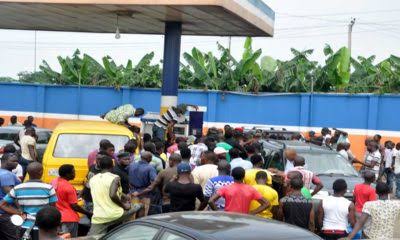The Independent Petroleum Association of Nigeria (lPMAN) has attributed the current fuel scarcity to unavailability of petroleum products and difficulty in accessing foreign exchange by marketers.
Mr Mike Osatuyi, the Operations Controller of lPMAN, made the remarks in an interview with the News Agency of Nigeria (NAN) in Lagos on Sunday.
Osatuyi said it had become necessary to inform the general public that the lingering scarcity of petrol was due to unavailability of the product.
He alleged that the Nigeria National Petroleum Corporation (NNPC) Ltd., had stopped importing enough petrol to meet demand in the country.
Osatuyi was emphatic that marketers could no longer sell at the regulated price because the unsteady supply of petrol had resulted in higher prices at the depots.
“We are experiencing scarcity because the product is not available.
“The price of a litre of petrol at private depots is currently between N205 and N210 as against N162.50.
“The Nigeria National Petroleum Corporation (NNPC) Ltd., is the sole importer of refined petroleum products, which are not readily available to marketers,” he said.
Osatuyi explained that his members bought petrol at over N200 per litre from private depots, making it impossible for them to sell at a regulated pump price.
READ ALSO:
- “You May Wish to Address Me as Dr. Obinna Iyiegbu;” Owner of Cubana Club Says After Bagging PhD
- PDP Guber Candidate Promises 1.2m Jobs in Enugu
- I’m Coming Back Soon- Oyetola Tells Osun People
“Besides, such trend is unsustainable given the fact that private depots also sell the product at unofficial rate different from that of NNPCL.
“When we add cost of transportation and levies, it will run into N217 per litre. At what prices do you want marketers to sell, knowing fully well that we are in business to make profit?
“My members are groaning over increase in cost of petrol from depot and they suffer a lot to get it.
“If fuel is there why will we not sell, but there is no fuel. Our members are selling petrol between N230 and N240 per litre at filling stations,” he added.
Osatuyi said government was finding it difficult to continue subsidiasing the price of petrol and advised that the downstream of the petroleum sector be fully deregulated as a permanent solution to the problem.
He urged the government to allow the private sector to import petrol as is the case with aviation fuel, diesel and kerosene.
He urged government to remove the monopoly of importation and pronounce total deregulation of the downstream sector.
Collaborating Osatuyi’s views, a marketer, who preferred not to be mentioned, told NAN that NNPCL was having challenges of importing refined product due to liquidity constraints.
According to the marketer, all marketers; IPMAN, Major Oil Marketers Association of Nigeria (MOMAN) and Depot and Petroleum Products Marketers Association of Nigeria (DAPPMAN) are struggling to get products from NNPCL, the sole supplier.
The marketers said scarcity of foreign exchange also posed a serious challenge, and that the Direct Purchase and Direct Supply (DPDS) option had crashed.
“Nigeria has reached a stage where government requested for credit facility from DSDP people on product supply but it was challenged due to huge backlog of debts.
“The NNPCL partners who were given crude oil to supply refined products could not access credit from banks due to existing huge debts,” said the marketer.
According to him, the high rate of forex currently at N800 to a dollar also posed a serious challenge to importation.
He said, “Talking about Lagos, that is where most of the (PMS) vessels come. When the mother vessel comes into the state, its products will be distributed by daughter vessels to ports in Lagos, Warri, Port Harcourt, etc.
“These daughter vessels are hired by independent private tank farm owners or private depot owners, who pay vessel charges in dollars.
“Some of them source dollars in the open market. So, the dollar also determines the price of products.
“Now, you cannot expect them to sell PMS at N184/litre when the price of hiring a vessel has risen from 38,000 dollars to around 108,000 dollars to 111,000 dollars, depending on the type of vessel. These charges are paid in dollars.”
He added that the cost of chartering daughter vessels to move products from the mother vessel to the Private Depot Owners (PDOs) has jumped within months due to issues around the hike in diesel cost, foreign exchange concerns and other industry problems.
“The products are moved to PDOs in Port Harcourt, Warri, Calabar, Lagos, etc, and by the time NNPC gives depot allocations, it becomes their responsibility to charter vessels that will take the products from the mother vessel to the depots.
“So, that lack of purchasing power in terms of sourcing dollars to evacuate products from the mother vessel, and absence of vessels to move products due to the hike in hiring cost also contributed to ghost scarcity of PMS across states.
“Ghost scarcity means scarcity that appears and disappears. You may be going to work in the morning and everywhere will be clear, but in the evening you will see queues,” the marketer stated.
He said the ex-depot price had gone above N205 per litre due to insufficient volume of petrol to supply the entire market by NNPCL.
According to the marketer, many DAPPMAN members have closed shop because NNPCL is unable to cope with the demand of petrol and most of the product is channel to neighbouring countries.
“About 50 per cent of the product is leaving the country, NNPC does not have any money to subsidise the entire West Africa, which is not realistic because they do not have money.
“The best option and the way out is to deregulate the downstream sector, but currently, government cannot deregulate because it’s election period,” said the marketer.


